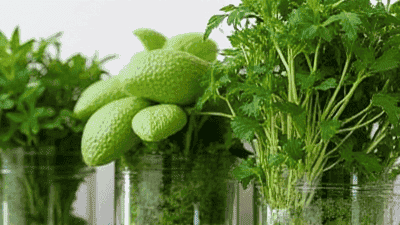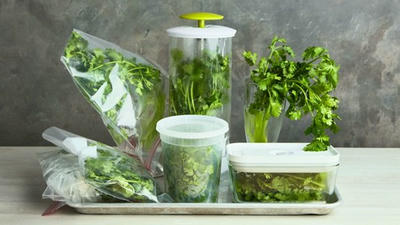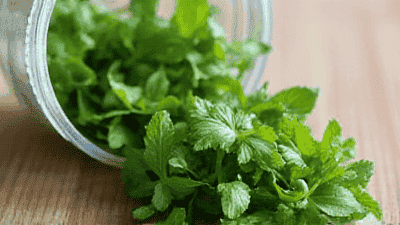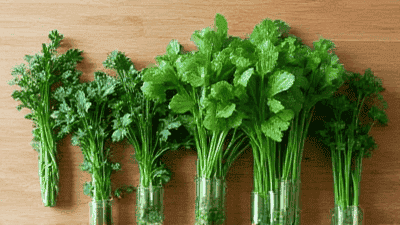
Fresh herbs can elevate any dish with their vibrant flavors, aromas, and colors. However, many home cooks struggle to store herbs properly, leading to spoilage and waste. Understanding how to store fresh herbs correctly can extend their shelf life and ensure you always have these flavorful ingredients at your fingertips. In this comprehensive guide, we’ll explore various methods for storing herbs, tips for selecting fresh herbs, the best storage techniques, and how to preserve their flavors for future culinary adventures.
Fresh herbs add depth and complexity to dishes, transforming ordinary meals into culinary masterpieces. Whether it’s the bright zest of basil in a Caprese salad or the robust earthiness of rosemary in a roast, herbs play an essential role in enhancing flavors.
Many fresh herbs are packed with vitamins, minerals, and antioxidants. For instance, parsley is rich in vitamins A, C, and K, while cilantro offers immune-boosting properties. Incorporating herbs into your cooking not only enhances taste but also contributes to a healthier diet.
Fresh herbs can be used in countless ways—from garnishing dishes to being incorporated into marinades, sauces, and dressings. Their versatility makes them a staple in kitchens around the world.

When it comes to storing fresh herbs, starting with high-quality ingredients is essential. Here are some tips for selecting fresh herbs at the market or grocery store:
Choose herbs that appear vibrant and lively. The leaves should be intact, with no signs of wilting, browning, or discoloration. Fresh herbs should also emanate a strong, fragrant aroma, which indicates their quality.
Opt for organic herbs whenever possible, especially for those that you plan to eat raw. Organic herbs are less likely to be treated with harmful pesticides, ensuring a healthier choice for your dishes.
Consider selecting herbs that are in season. Seasonal herbs are more likely to be fresher, tastier, and less expensive. Familiarize yourself with the herbs that are readily available during different times of the year.
Storing fresh herbs properly is crucial for preserving their flavor and texture. Here are several methods to consider, depending on the herb type and your storage preferences:
Refrigeration is a common and effective method for storing fresh herbs. However, the way you store them can greatly impact their freshness.
This method works best for delicate herbs like parsley, cilantro, and basil.
This method helps maintain humidity while preventing excess moisture that can lead to spoilage.
Some hardy herbs, like mint and basil, benefit from being stored upright in water, much like flowers in a vase.
Freezing is an excellent way to preserve fresh herbs for later use. It’s particularly beneficial for bulk herbs or those nearing the end of their shelf life.
Frozen whole leaves can easily be added to soups, stews, and sauces.
For a more convenient option, consider freezing herbs in olive oil or broth.
This method provides easy portions of herbs that add flavor to various dishes.
Drying herbs is another effective preservation method, allowing you to store herbs for long periods without refrigeration.
For a quicker drying method, consider using an oven or a food dehydrator.
Making herb salts or pestos is another creative way to extend the flavor of fresh herbs while using them in various dishes.
Pesto can be made with a variety of herbs, offering a delicious way to preserve their flavor.

Understand Each Herb’s Characteristics: Different herbs have unique qualities; some are more delicate and require careful storage methods. For example, basil is more sensitive to cold and is better off stored at room temperature, while woody herbs like rosemary can withstand refrigeration.
Use Breathable Containers: If using containers, consider perforated bags or containers that allow some airflow to avoid excess moisture buildup.
Keep Away from Ethylene Producers: Certain fruits (like apples and bananas) emit ethylene gas, which can cause herbs to wilt faster. Store herbs away from these fruits.
Trim the Stems: If placing herbs in water, trim the stems before starting to store them, as this encourages water uptake, keeping them fresher longer.
Monitor Freshness Regularly: Inspect your stored herbs frequently to remove any wilting or spoiling leaves to prevent spoiling the rest.
Chop Just Before Use: For the best flavor and aroma, chop herbs just before adding them to dishes. This preserves their essential oils.
Layer Flavors: When cooking, consider adding herbs at different stages. For example, add sturdy herbs like rosemary early in cooking for infusion, and sprinkle delicate herbs like parsley fresh at the end for a burst of flavor.
Experiment with Combinations: Don’t be afraid to mix different herbs. Create your own blends according to your taste preferences and the dishes you’re preparing.
Infuse Oils and Vinegars: Use fresh herbs to make infused oils or vinegars by steeping them in olive oil or vinegar for a few weeks. Strain and use them in dressings or marinades.

Not Washing Herbs: Always wash herbs gently to remove dirt and pesticides. This is crucial, especially considering some herbs may harbor insects.
Ignoring Temperature: Some herbs wilt quickly when exposed to cold. Understanding the temperature preferences of each herb can help maintain their freshness.
Storing Wet Herbs: Excess moisture can lead to quick spoilage. Make sure to thoroughly dry your herbs before storing.
Failing to Label Storage Methods: If using multiple storage methods, labeling containers can help you keep track of which herbs are stored where and when they need to be used.
Storing fresh herbs properly is essential for extending their flavors and making the most of your culinary creations. By understanding the specific needs of different herbs, utilizing effective storage methods, and applying a few tips for maximizing freshness, home cooks can ensure they always have quality herbs on hand for their dishes.
With this comprehensive guide, you’ll be able to store and use fresh herbs like a pro. Embrace the vibrant flavors of herbs in your cooking and explore the many ways they can enhance your culinary experiences. From aromatic pestos to herb-infused oils, let fresh herbs inspire your kitchen adventures for weeks to come!